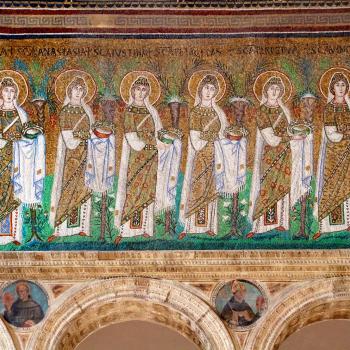![Sack of Rome by Évariste Vital Luminais [Public domain or CC BY-SA 3.0 (http://creativecommons.org/licenses/by-sa/3.0)], via Wikimedia Commons](https://wp-media.patheos.com/blogs/sites/637/2017/02/Evariste-Vital_Luminais_-_Le_Sac_de_Rome-204x300.jpg)
Therefore, you rich men, you are the first to levy, be the first to give. Be the first in generosity of goods, you are who the first in profusion of words. You who give of mine, give of thine. Most justly, whoever you are, you who alone wish to receive favor, alone you should bear the expense. But to your will, O rich men, we the poor accede. What you, the few, order, we all pay. What is so just, so humane? You decrees burden us with new debts; at least make your debt common to us all. What is more wicked and more unworthy than that you alone are free from debt, you who make all us debtors? [2]
Rome, therefore, felt the judgment for its injustice, similar to the way Micah said Israel suffered the judgment of God’s wrath because its government accepted the pleas of the rich, with their bribes and impiety, instead of the justice of God:
But as for me, I am filled with power, with the Spirit of the LORD, and with justice and might, to declare to Jacob his transgression and to Israel his sin. Hear this, you heads of the house of Jacob and rulers of the house of Israel, who abhor justice and pervert all equity, who build Zion with blood and Jerusalem with wrong. Its heads give judgment for a bribe, its priests teach for hire, its prophets divine for money; yet they lean upon the LORD and say, “Is not the LORD in the midst of us? No evil shall come upon us.” Therefore because of you Zion shall be plowed as a field; Jerusalem shall become a heap of ruins, and the mountain of the house a wooded height (Mic. 3:8-12 RSV).
Corrupt government, therefore, is to be condemned, and such corruption is easily discerned when officials put their own private interests and luxurious lifestyles over the needs of the people. The complaint of St. Basil, for the elite of his era, remains valid in our time:
You begrudge your fellow human beings what you yourself enjoy; taking wicked counsel in your soul, you consider not how you might distribute to others according to their needs, but rather how, after receiving so many good things, you might rob others of their benefit. [3]
If some would object, but our leaders are pious, promoting the Christian faith, we must remember, there is no piety when justice is denied, as St. Peter Chrysologus declared:
Before God, piety does not exist without justice, nor justice without piety. According to the heavenly meaning of the terms, justices does not exist without goodness, nor goodness without justice. If these virtues are separated they vanish. Equity without goodness is savagery; justice without love is cruelty. [4]
The appearance of piety by someone declaring themselves to be favorable to religion is shown to be false when that religious heritage, with its moral expectations, are denied. Justice, with the promotion of the common good, looking for the well-being of the least among us, is required if someone is going to be truly pious. If someone uses religious rhetoric while acting against the common good, their piety is an illusion, and when it is used as a shield to protect injustice, the illusion of piety must be overturned through the truth of justice. If we truly want the wisdom which comes with piety, we will no longer play the fool for special interests of the elite; we will not allow wickedness to be encased by a pretend faith. We will demand the sanity of justice, and work for it in ourselves, lest we, with the rest of those who serve injustice, find ourselves denied by Christ, as Salvian warned:
I once read somewhere, ‘no one is evil but a fool: for if he were wise, he would prefer to be good.’ And you, therefore, if you can at this point return to sanity, cast aside wickedness if you wish to possess wisdom. For, if you desire to be wise or sound-minded at all, you must change and free yourself from yourself completely. Deny yourself, therefore, lest you be denied by Christ; disown yourself, in order that you may be received by Christ; lose yourself, lest you perish. [5]
It is time to make a choice. It is always time to make a choice. Every day we must decide who it is we will serve.
[1] Salvian, The Governance of God in Salvian the Presbyter. trans. Jeremiah F. O’Sullivan (Washington, DC: The Catholic University of America Press, 1962), 140-1.
[2] Salvian, The Governance of God, 139.
[3] St. Basil, “I Will Tear Down My Barns” in On Social Justice. trans. C. Paul Schroeder (Crestwood, NY: St. Vladimir’s Seminary Press, 2009), 62.
[4] St. Peter Chrysologus, “Sermon 145” in St. Peter Chrysologus: Sermons; St. Valerian: Homilies. trans. George E. Ganss, SJ (New York: Fathers of the Church Inc., 1953), 232-3.
[5] Salvian, The Governance of God, 150.
Stay in touch! Like A Little Bit of Nothing on Facebook:
A Little Bit of Nothing

















